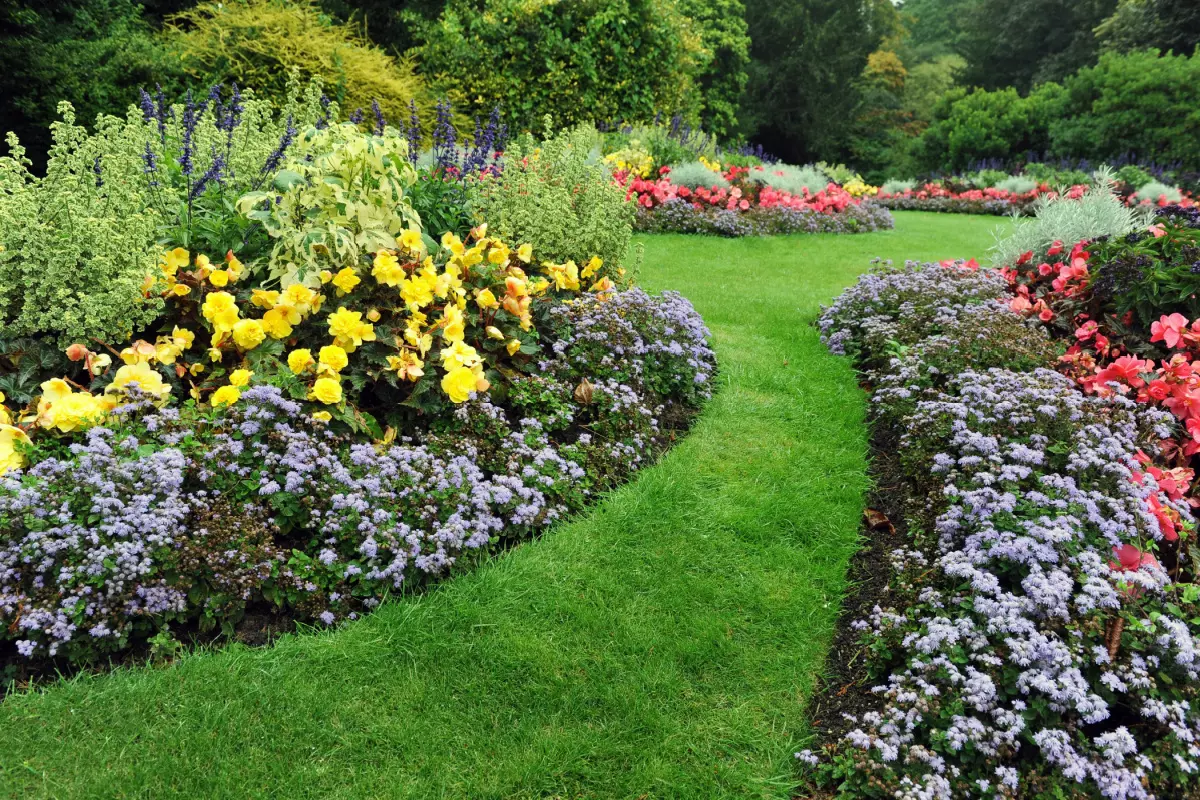Whether you are starting out or an experienced professional, understanding the financial prospects of a career in landscaping can be very helpful for your career path. From entry-level positions to senior roles, earning potential is influenced by experience, location, and specialization.

This article will examine how much money a landscaper can expect to make at different points in their career and how they can enhance their salaries.
How Much Do Landscapers Make?
In the U.S., the landscaping industry is worth about $176 billion, with around 649,131 landscaping businesses employing over 1.3 million people. With the growing demand for well-designed outdoor spaces among residents, the average profit margin for a landscaping business is around 10%.
Let’s look at what landscapers with different experience levels can expect to make annually and hourly in this field.
Average Landscaper Salary
How much a landscaper can earn is determined by various factors such as experience, location, and specialization. For example, if you have just started your career or have less than five years’ experience, the starting salary for a landscaper may range between $27,550 and $48,530 per year.
If you have more than five years of experience, your landscaping job salary will go up significantly, ranging from $34,650 to $48,800 per year. This number reflects your growing expertise and skills, impacting your overall landscaping salary.
If you’re an experienced landscaper who has been working for over ten years, expect an annual income between $49,070 and $78,880. This is because you are more likely to hold supervisory roles or specialize in high-demand areas like horticulture or landscape architecture.
Landscaper Earnings Per Hour
If you work part-time or on a project basis, then knowing how much a landscaper makes per hour can be more beneficial. For newcomers in the field, hourly rates are between $13.25 and $16.63. This is because they are more likely to undertake basic duties such as plant installation and maintenance.

If you’re a mid-level landscaper with a few years of experience, your hourly income will vary from $16.66 to $23.46 an hour.
If you’re an experienced landscaper with unique, specialized skills, you can earn about $23.59 to 37.92 per hour. You are more likely to oversee large-scale projects, provide expert consultation, and have thorough landscaping knowledge.
Landscaper Salary by State
The salary for landscaping professionals varies substantially across different states in America. This is mainly because of regional differences in the cost of living, demand for these services, and local economic conditions.
Below is a table showing the average hourly rate and annual salary for landscapers in each state:
| State | Average Annual Salary* | Average Hourly Rate |
|---|---|---|
| Alabama | $31,883 | $15.33 |
| Alaska | $41,433 | $19.92 |
| Arizona | $34,981 | $16.82 |
| Arkansas | $32,348 | $15.55 |
| California | $40,495 | $19.47 |
| Colorado | $38,218 | $18.37 |
| Connecticut | $40,364 | $19.41 |
| Delaware | $36,355 | $17.48 |
| District of Columbia | $46,460 | $22.34 |
| Florida | $36,163 | $17.39 |
| Georgia | $36,078 | $17.35 |
| Hawaii | $38,822 | $18.66 |
| Idaho | $34,344 | $16.51 |
| Illinois | $38,758 | $18.63 |
| Indiana | $34,750 | $16.71 |
| Iowa | $34,229 | $16.45 |
| Kansas | $34,209 | $16.44 |
| Kentucky | $33,781 | $16.24 |
| Louisiana | $29,554 | $14.21 |
| Maine | $38,689 | $18.60 |
| Maryland | $37,909 | $18.60 |
| Massachusetts | $42,198 | $20.29 |
| Michigan | $35,649 | $17.14 |
| Minnesota | $38,698 | $18.60 |
| Mississippi | $29,174 | $14.02 |
| Missouri | $34,438 | $16.56 |
| Montana | $40,656 | $19.54 |
| Nebraska | $33,361 | $16.04 |
| Nevada | $37,938 | $18.24 |
| New Hampshire | $39,139 | $18.84 |
| New Jersey | $39,400 | $18.94 |
| New Mexico | $33,598 | $16.15 |
| New York | $42,137 | $20.26 |
| North Carolina | $36,566 | $17.58 |
| North Dakota | $38,135 | $18.33 |
| Ohio | $34,864 | $16.77 |
| Oklahoma | $33,599 | $16.15 |
| Oregon | $39,808 | $19.14 |
| Pennsylvania | $35,780 | $17.20 |
| Rhode Island | $39,119 | $18.81 |
| South Carolina | $32,844 | $15.79 |
| South Dakota | $33,049 | $15.89 |
| Tennessee | $33,698 | $16.20 |
| Texas | $42,612 | $20.49 |
| Utah | $32,718 | $15.73 |
| Vermont | $42,103 | $20.24 |
| Virginia | $35,546 | $17.09 |
| Washington | $42,520 | $20.44 |
| West Virginia | $39,129 | $18.82 |
| Wisconsin | $37,870 | $18.21 |
| Wyoming | $36,511 | $17.55 |
Landscaper Salaries by Specialization
Specializing in a niche can help you increase your salary. This may be due to high demand in your area or a limited number of professionals offering that service. Overall, specializing in more than just basic landscaping services can also help you stand out and earn more because of your particular skill set and experience.

Let’s explore the average landscaping salary for each specialization:
Agronomist
Agronomists specialize in the science of crop production and soil management. They typically hold a bachelor’s or a master’s degree in agronomy. Agronomists work closely with large-scale agricultural operations to increase crop yields and improve soil fertility. On average, they make $79,940 per year.
Arborist
Arborists, also known as tree surgeons, deal mainly with trees’ well-being and maintenance. Although formal certification is not really mandatory, employers may prefer working with certified professionals. Their expertise covers areas such as diseases infecting trees and how trees can be pruned safely. Arborists earn about $49,820 per year.
Botanist
Botanists are plant biology experts who often have advanced degrees in botany or plant sciences. They carry out research activities while working in different environments, including laboratories, universities, and other environmental organizations, aimed at advancing knowledge on plant growth, reproduction, and disease resistance. Botanists can earn an average of $90,431 annually.
Landscape Designer
Landscape or exterior designers create outdoor spaces that are both visually appealing and practical for residents. They must know plant science, design principles, and how to use software to create detailed plans. With skills in landscape architecture or design, they can earn an annual salary of $56,402.
Landscape Architect
Landscape architects are highly trained professionals who design large commercial outdoor spaces such as parks, campuses, and even urban areas. This position requires a bachelor’s or master’s degree in landscape architecture and possibly state licensure. It pays an average of $77,820 per year.
Factors Influencing Landscaper Salaries
Several factors can determine how much a landscaper can earn, influencing their salaries. Here are some key factors that can shape your paycheck as a landscaper:
Experience
Experience in landscaping that influences earning potential includes working on diverse residential, commercial, and hardscaping projects. You can also gain valuable experience by taking on leadership roles and excelling in client relations.

Skills that are currently in high demand include being able to handle diverse projects, technical proficiency in using landscaping tools, and effective communication. All these skills and experience can lead to higher rates and career growth.
Education
You don’t always need a formal degree to start in landscaping, but having one can definitely help. A high school diploma or GED is usually enough to get your foot in the door.
However, pursuing further education like a bachelor’s or a master’s in specialized areas like horticulture, landscape architecture, or agronomy can open doors for better-paying jobs, leading to a higher commercial landscaper salary. These university programs typically span four to five years for a Bachelor’s degree and an additional two to three years for a Master’s degree.
Location
Where you work plays a significant role in your salary beyond the cost of living. For instance, high-demand areas like California or New York often require specializations in fields like urban landscape design and eco-friendly services, which can increase earnings.
Additionally, regions with less competition and higher demand for specialized experience may offer higher wages to attract skilled landscapers.
Specialization and Certifications
Different market needs can influence your earning potential. For example, people are now more concerned about sustainable development, hence adopting eco-friendly methods when designing their gardens or lawns.

Clients want contractors who know how to use drought-resistant plants, native species, and other environment-conscious techniques during installation, which can increase their landscaper salary. Certifications such as the Leadership in Energy and Environmental Design (LEED) and SITES Accredited Professional highlight expertise in sustainable design. These certificates focus on sustainable building practices, land development, and management.
Getting certified by an organization like the International Society of Arboriculture (ISA) or the National Association of Landscape Professionals (NALP) can also help you enhance your credentials and improve your chances for higher pay. These certifications cover tree health and care, landscape management, and best practices.
Strategies for Increasing Your Landscaping Salary
Being a good landscaper is not only about the number of hours that you put in at work. It’s also about making smart moves that enhance your skills, qualifications, and career prospects. Here are some ways to increase your landscaping salary:
Pursue Continuous Education and Certifications
Earning professional certifications can set you apart and potentially increase your landscaping salary by 10% to 20%. Certifications demonstrate that you have advanced knowledge and skills, making you more attractive to employers and clients who value expertise and professionalism.
Consider earning the following landscaping certifications to help boost your salary:
- Certified Landscape Technician (CLT): This certification is offered by the National Association of Landscape Professionals (NALP). It covers landscaping installation, maintenance, and irrigation. To get certified, you must complete a written and hands-on test in your specialty area. The goal of the exam is to assess practical skills and knowledge. To apply, visit the NALP website.
- Certified Arborist (ISA): If you want to specialize in tree care, this certification provided by the International Society of Arboriculture (ISA) would be helpful. It covers topics like tree biology, soil management, and tree risk assessment. To earn this certification, you must pass a comprehensive exam with 200 multiple-choice questions and have at least three years of full-time experience in arboriculture or a related degree. You can apply via the ISA website.
- Landscape Industry Certified (LIC): Also provided by the NALP, this certification covers various specialties, including exterior and interior landscaping, lawn care, and horticulture. Candidates must pass a series of exams testing both written knowledge and hands-on skills in their chosen specialty. You can find application details and exam schedules on the NALP website.
- Similarly, investing in further education can also lead to higher salaries as it shows advanced knowledge and skills. Here are some options to consider:
- Horticulture and Botany Courses: Taking soil science, pest management, and plant biology classes can expand your knowledge and increase your employability. These courses are often offered by universities, community colleges, and online platforms such as Coursera and Udemy. For instance, institutions like Cornell University and the University of California offer specialized programs in horticulture and botany. On average, you can gain all the required knowledge by completing 40 to 60 hours of coursework.
- Landscape Design Software Training: Mastering how to use software tools like AutoCAD, SketchUp, or Land F/X can improve your ability to design complex landscapes. Courses are available through online platforms like LinkedIn Learning, Lynda, and specific software websites. Local community colleges and professional organizations, such as the American Society of Landscape Architects (ASLA), also offer training programs. These courses can vary in length, but a commitment of around 20 to 40 hours is common. This skill can earn you an additional 5% to 10%.
- Sustainable Landscaping Practices: Training in sustainable practices such as xeriscaping and the use of native plants is becoming more popular than ever. Training programs are available through organizations like the Sustainable Sites Initiative (SITES), universities, and online platforms like Coursera and EdX. The commitment typically involves completing 20 to 30 hours of training.
Pick a Specialization and Develop Advanced Skills
Becoming an expert in one aspect of landscaping can make you highly sought after because it allows you to develop in-depth knowledge and skills that are in high demand. This sets you apart from those who have general knowledge and allows you to command higher fees for your services.

Here are some landscaping specializations to pursue:
- Hardscaping: Specializing in the design and construction of outdoor features like patios, walkways, and retaining walls can be highly lucrative. Experienced hardscape installers can earn 15% to 20% more than general landscapers. Training is available at vocational schools, community colleges, or through professional organizations such as the Interlocking Concrete Pavement Institute (ICPI). The courses typically require a commitment of 40 to 60 hours.
- Irrigation Systems: Irrigation specialists design, install, and maintain systems that distribute water to landscapes, ensuring optimal water usage and plant health. They also troubleshoot and repair existing systems to improve efficiency. Becoming a Certified Irrigation Contractor (CIC) from the Irrigation Association can increase your salary by 10% to 15%. To earn this certification, you must complete a series of courses and pass an exam, which usually requires around 40 hours of study.
- Project Management: Enroll in project management courses to increase your chances of securing higher positions within an organization, like project manager, senior project manager, or operations manager. Doing so can contribute to a 20% to 25% salary increase. Project managers are responsible for planning, executing, and completing landscape projects. They coordinate between clients, designers, and crew members to ensure the projects are finished on time, within budget, and to the client’s satisfaction. The Project Management Professional (PMP) certification is among the most recognized qualifications in this field. Candidates must complete 35 hours of project management education and pass a rigorous exam. You can find these classes through various organizations, including the Project Management Institute (PMI).
- Advanced Horticulture Techniques: Investing in advanced horticultural skills like grafting, pruning, and pest control can make you a more valuable asset for a company. Dedicating 20 to 30 hours per year in advanced training may result in a 5% to 10% landscaping salary increase. Training can be obtained through university extension programs, botanical gardens, and online courses offered by institutions like the Royal Horticultural Society (RHS) and Coursera.
Offer Client Financing
If you’re already a landscaping business owner, you can employ strategies outside of traditional marketing to increase your profit and salary. After all, the more your business makes, the more you make in yearly income.
You may have noticed that a major hurdle for your clients is the upfront cost of large-scale landscaping services. They may not have the funds required to undertake the project, leading them to forgo starting at all.
Offering financing options to your clients allows them to say yes without worrying about payment. With financing, your clients can opt to pay for the cost of landscaping services in monthly installments with competitive rates. In turn, this increases the number of projects you complete, the revenue your business generates, and your salary.
To offer landscaping financing to your clients, partner with a SaaS provider with a large lender network that offers various financing options, rates, and promotions. Also, make sure the lenders offer credit inclusive solutions, making financing available to a broader range of clients.
Final Thoughts
Understanding the financial aspect of the landscaping industry helps in making informed career decisions. Salaries vary greatly based on experience, specialization, and location.
However, beyond these figures lies the real value of a career in landscaping: the opportunity to shape and enhance our outdoor environments. As the demand for well-designed, sustainable spaces grows, so does the potential for financial and personal fulfillment in this field.
FAQ
Check our FAQ section if you still have questions about landscaping salary:
Do You Need a License to Do Landscaping?
Yes, you need licensing. However, it may depend on where you live and what activities you carry out. For example, some areas may require landscaping licenses for pesticide use or irrigation work.
For specific requirements, consult your state’s Department of Agriculture or your local municipal or county government office responsible for business licensing and regulation.
How Do You Start a Landscaping Business?
Here’s how to start your landscaping business:
- Create a business plan that covers all the services you want to offer and their costs.
- Register your business with the appropriate state or local agency, such as the Secretary of State or local county clerk’s office, to ensure you comply with legal requirements.
- Choose your business structure, like an LLC, sole proprietorship, or partnership.
- Get the necessary licenses, permits, and equipment for this type of work.
- Look into different landscaping financing options.
- Market your landscaping services online and offline, and consider hiring reliable staff if necessary.
What Are the Latest Trends in the Landscaping Industry?
Some of the latest trends in landscaping include using sustainable methods such as drought-resistant plants, designing outdoor living spaces like patios with fire pits, installing smart irrigation systems that save water, creating vertical gardens that are great for small spaces, and edible landscapes that combine beauty and functionality.


